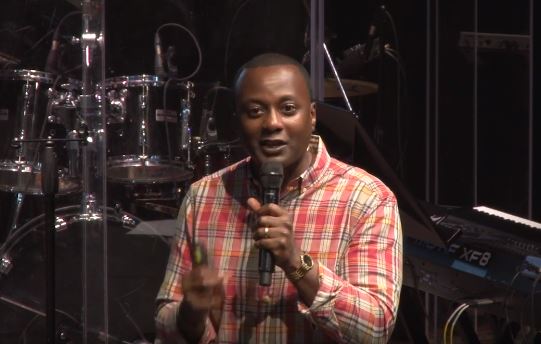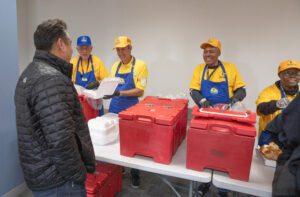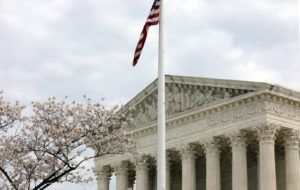
HAMILTON, Bermuda (BP) — Traditional marriage proponents in many U.S. states and other western nations see a disheartening trend when it comes to same-sex marriage: Citizens vote to reject it. A court overturns the will of the people. Same-sex marriage becomes the law of the land.

Following a campaign spearheaded by a multiethnic consortium of pastors and other Christian leaders, Bermuda residents rejected same-sex marriage by a 69-percent majority and same-sex civil unions by a 63 percent majority in a June 23 referendum.
Through the result technically is nonbinding, traditional marriage proponents are encouraged because it puts pressure on Bermuda’s legislators to uphold the territory’s bans on same-sex marriage and civil unions, and courts ultimately seem unlikely to strike down such bans. The European Court of Human Rights, meanwhile, under whose jurisdiction Bermuda falls, is the ultimate arbiter of any legal challenges and does not regard marriage, including same-sex marriage, as a human right.
The referendum was initiated by government officials as a public opinion poll of sorts, but voter turnout of 47 percent was 3 percentage points too low for the referendum to be declared officially valid.
Still, Gary Simons, a nondenominational pastor who helped lead Preserve Marriage, the main group opposed to same-sex marriage, told Baptist Press the vote “sends a strong message to the government as well as to the community as to what the people want.”
Today (July 8) House of Assembly member Wayne Furbert said he will take up a bill defining marriage as only between a man and a woman, noting according to Bermuda’s Royal Gazette, “The referendum has made it very clear that the majority of Bermudians do not want same-sex marriage.”
Pastors ‘come together’
Simons, pastor of Cornerstone Bible Fellowship in Hamilton, said increased unity among pastors is a byproduct of their joint stand for marriage.
“Pastors have come together to get educated, to understand what this whole topic is about,” Simons said. “At the same time, we would like to make our churches a safe place for those who are struggling sexually.” We will “continue to show love but speak the truth in love.”
Among the campaign tactics of Preserve Marriage were praying, fasting, preaching, blogging, posting on social media, launching a petition and meeting with government officials.
Pastors helped bring in speakers from Europe and the U.S. throughout the campaign, Simons said, including Texas pastor Tony Evans and Ryan Anderson of The Heritage Foundation, a conservative American think tank. The nonprofit legal organization Alliance Defending Freedom assisted traditional marriage proponents as well.
For Preserve Marriage, the U.S. served “as a case study,” Simons said, to illustrate the changes that tend to occur after a nation legalizes same-sex marriage: redefinition of gender, discrimination against Christian adoption agencies, the classification of traditional values as bigoted and pressure on state education boards to adopt curricula normalizing same-sex sexual relations.
Traditional marriage advocates also told voters “that in almost every country which has redefined marriage, civil unions were first introduced” only to be subjected later to a “separate but unequal argument which results in the redefinition of marriage,” according to the Preserve Marriage website.
Simons cited the courage of “many” pastors as a factor in the referendum results.
“Various pastors have taken either some hate speech or some type of suffering in regard to this” issue, Simons said, “though it’s incomparable to what people are going through in other countries.”
‘Willing to stand up’
Nicholas Dill, the Anglican bishop of Bermuda, affirmed churches’ leading role in the referendum campaign even though only about 30 percent of Bermuda’s 65,000 residents attend church on any given weekend.
Simons and other Preserve Marriage pastors “were willing to stand up and to be seen leading the charge,” Dill told BP, “and it wasn’t a popular thing. There was a lot of invective against the church.”
A lay Pentecostal couple was noteworthy for publicly opposing the pro-gay marriage side’s slogan “love wins,” Dill said.
“They were very keen to say, ‘Yes, love does win. God is love, and we love all people. But we also love God and His Word, and we want people to know that He loves them even though He may not always agree with the way they choose to live their lives.'”
During the campaign, Dill met personally with multiple government officials, including Premier Michael Dunkley, who supports civil unions. He provided them with research from University of Texas sociologist Mark Regnerus which found children fare better when raised by a married mother and father.
Preserve Marriage activists helped government leaders understand the European Court of Human Rights’ view of marriage.
The path forward
Moving forward, Dill said, Bermuda churches must buttress their opposition to same-sex marriage with increased focus on building healthy heterosexual marriages.
“A fair criticism that’s been made by those who opposed the churches’ stand is that we’ve not been very good in supporting [marriages] generally,” Dill said. “Our divorce rates in Bermuda within the church are as bad as they are outside the church.”
The path forward also includes compassionate ministry to the homosexual community, according to Preserve Marriage.
“The LGBT community is not ‘them,'” Preserve Marriage stated in a news release the day following the referendum, “it’s us: our loved ones, our family members and our friends. Although we disagree on this current topic, we are confident that we can continue to love and respect one another as we live in peace and harmony together.”














